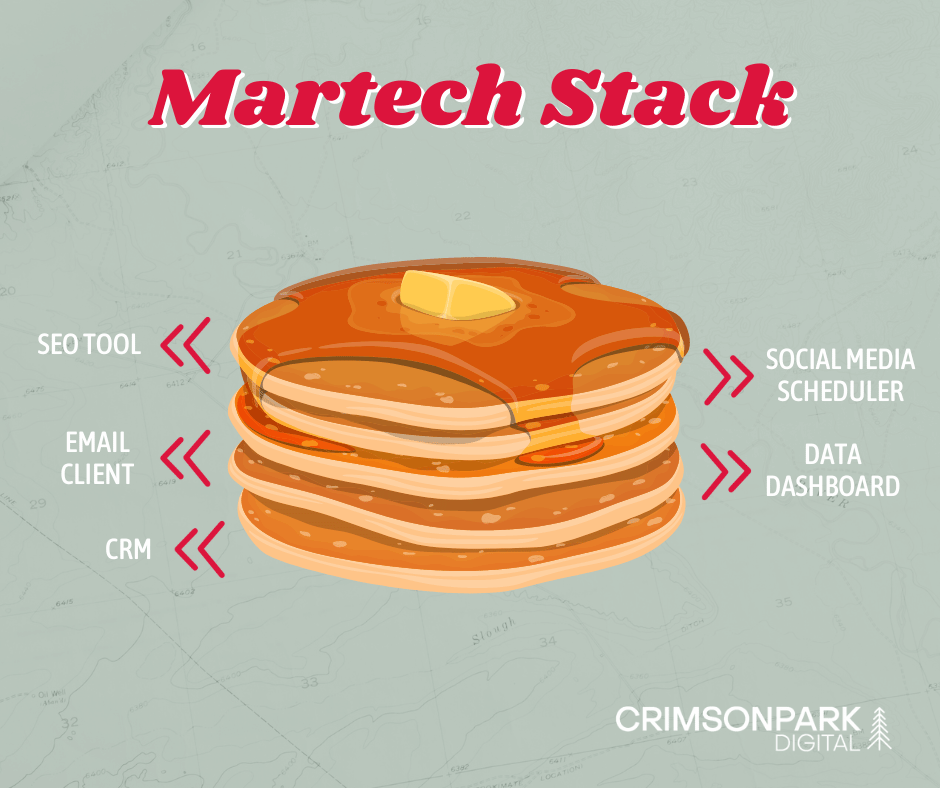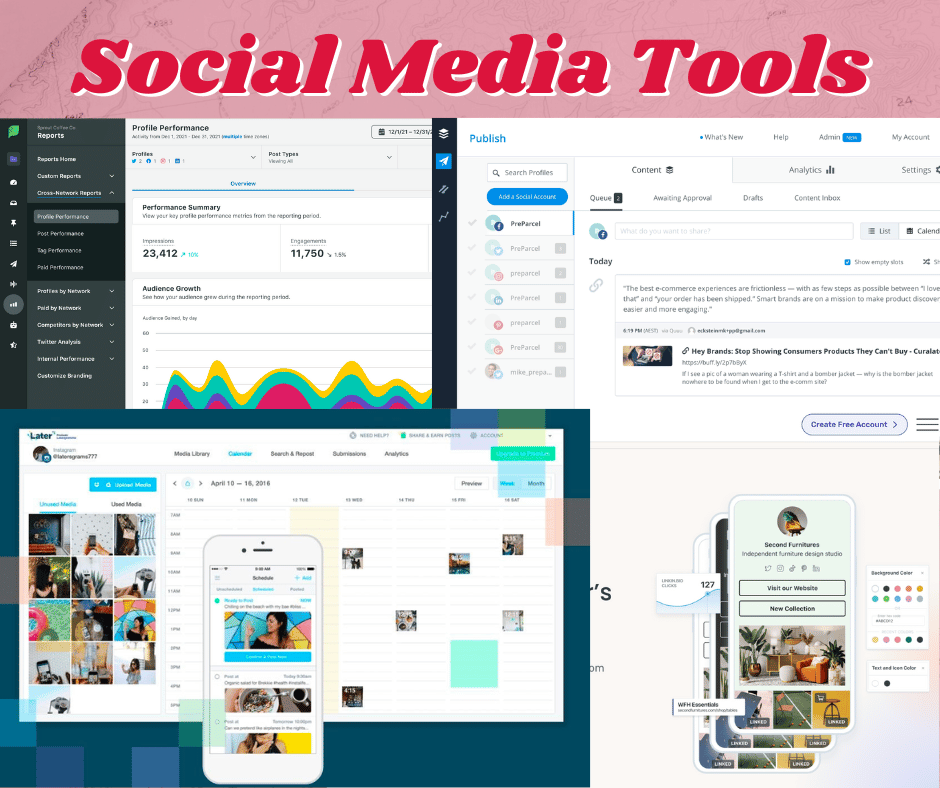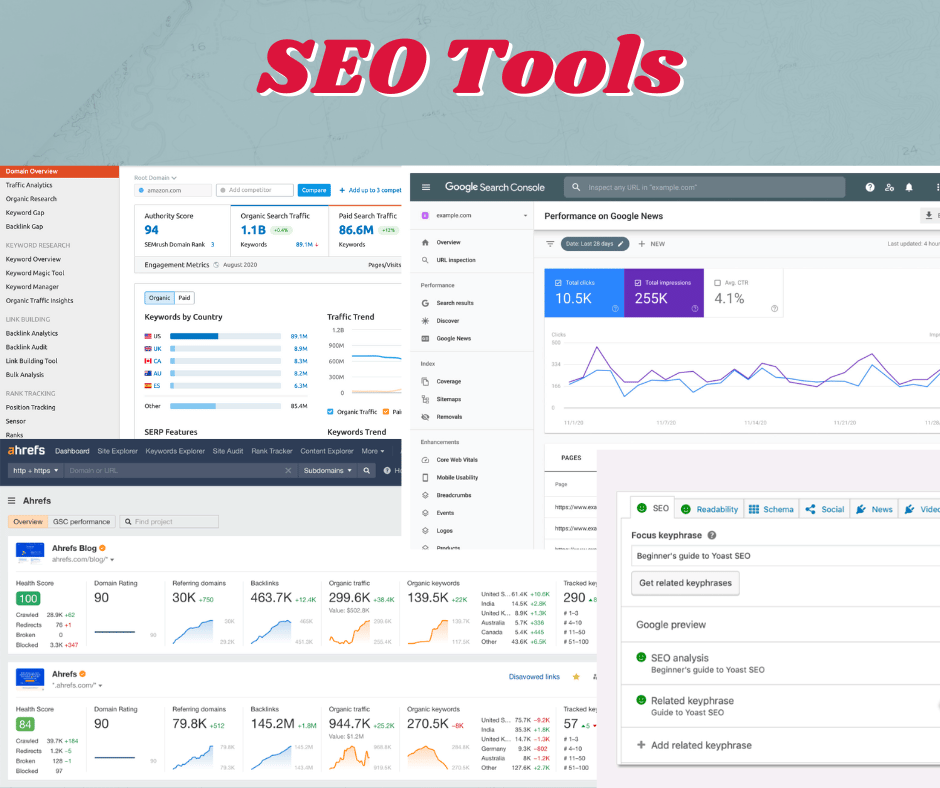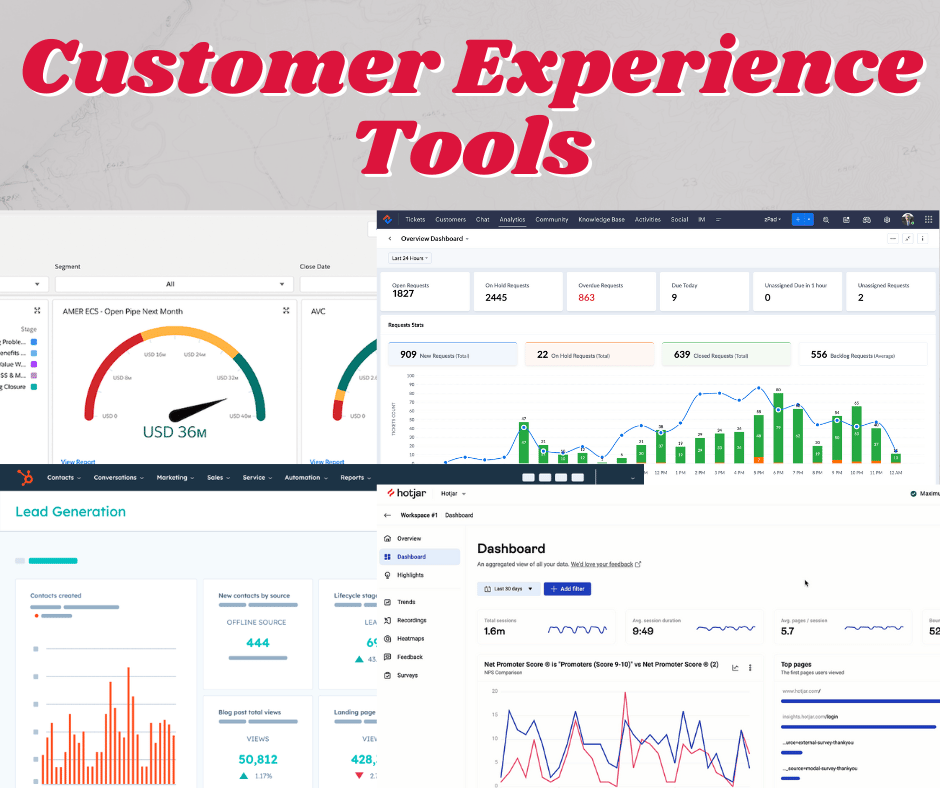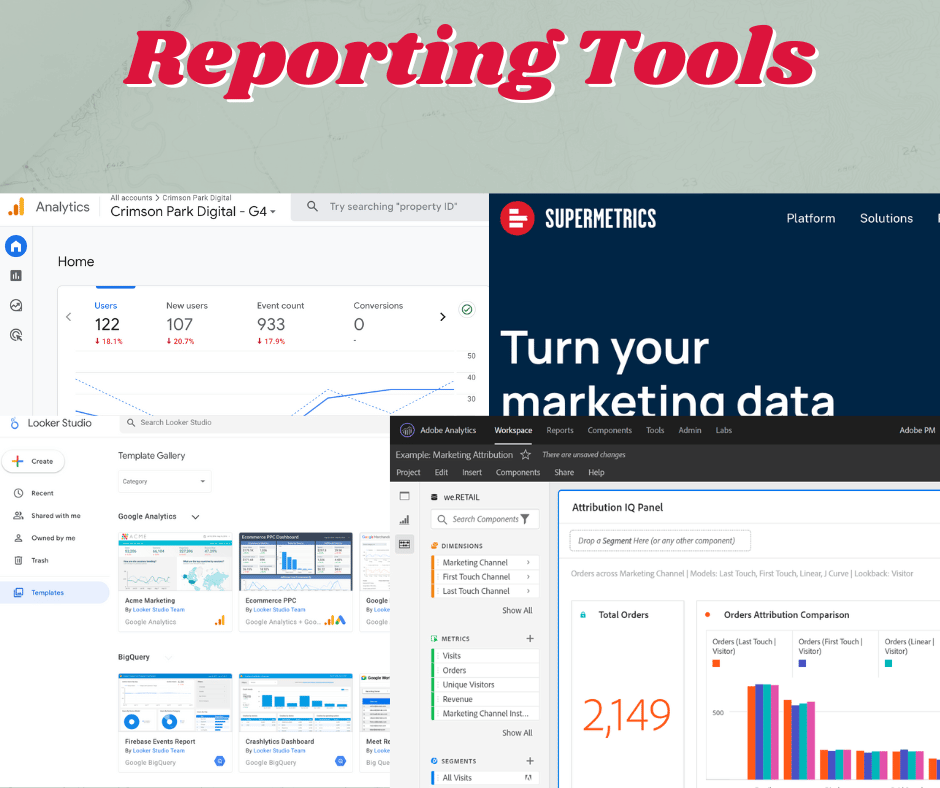MarTech Tools Your Business Needs to Grow
Embarking into the realm of martech tools for startups can be intimidating. What options are there? Which are the best platforms? How much do you need, and what will it cost?
Fortunately, there are many digital tools to help manage marketing and operations for startups, as well as other businesses just starting out. These tools, called “Martech” (marketing technology), will help you create processes, integrate automation, reduce time spent, and assist in producing impressive campaign results.
We’ve compiled some of our favorite Martech tools for startups of any seed stage, including digital marketing reporting tools, SEO tools for digital marketing, and the top online tools for project management.
Skip ahead or read on for the full guide.
What is a Martech stack?
A “Martech stack” refers to the collection of various software tools, platforms, and technologies that a company uses to manage and execute its marketing efforts. Companies may have digital tools for customer engagement, data analysis, content creation, campaign management, social media marketing, email marketing, and more in their Martech stacks.
The components of a Martech stack can vary widely depending on the size of the company, its industry, and its specific marketing goals. By strategically selecting and integrating a collection of these technologies, businesses can streamline their marketing processes, gain valuable insights from data, enhance customer engagement, and optimize their overall marketing strategies.
A Martech stack’s goal is to provide businesses with the necessary tools to effectively navigate the ever-evolving digital landscape and drive growth for their business, which is especially important when approaching digital marketing for startups.
The Best Digital Marketing Tools for Social Media Planning
Digital tools can help streamline social media processes by providing a platform for scheduling, performance analysis, and audience engagement.
The best tools for startup social media marketing in 2023 are Sprout Social, Later, and Buffer.
Sprout Social
Sprout Social is our agency’s preferred social media Martech because of its robust reporting and collaboration capabilities. It offers scheduling, engagement, social listening, and analytics features. It’s also known for its detailed social media reports and collaboration tools.
Buffer
Buffer is known for its user-friendly interface and scheduling capabilities. It also provides analytics and allows collaboration among team members. One of the rare features of Buffer compared to other social media Martech is its free plan which allows up to 3 channels, includes planning and publishing tools, and a landing page builder – features that align well with early-stage startups.
Later
Later is an easy-to-use visual content planning tool, primarily focused on Instagram. It offers a visual content calendar, allows you to schedule posts, and provides features for curating user-generated content (UGC). It also has an analytics feature that delivers insights in digestible formats.
Linkin.bio
Linkin.bio is a tool that allows a mini link directory page to be built into Instagram and TikTok profiles. Linkin.bio is a subsidiary of Later, and the two platforms easily integrate.
SEO Tools for Digital Marketing
Martech specializing in SEO offers a range of features to address various aspects of SEO, from keyword research to technical optimization and competitor analysis. Choosing the right tool will depend on your startup’s business goals and budget.
Here are some of the top SEO tools for digital marketing:
Semrush
Semrush is one of our agency’s preferred tools for SEO and content development. Semrush is a versatile tool offering features like keyword research, site audits, competitor analysis, rank tracking, and more. It also provides insights into paid advertising and social media strategies.
Ahrefs
Ahrefs is a comprehensive tool known for its backlink analysis, keyword research, site audit, and competitive analysis features. It provides valuable insights into your website’s SEO performance and helps in planning your content strategy.
Google Search Console
This is a free tool provided by Google that offers insights into how Google’s search engine views your website. It provides data on search traffic, site performance, and indexing issues.
Yoast SEO
Yoast SEO is a popular plugin for WordPress websites that provides real-time content analysis and recommendations to optimize on-page SEO.
Martech for Customer Experience
Customer experience and management tools cater to various aspects of marketing and customer relationship management (CRM), helping you streamline your processes, manage customer interactions, and drive growth. The choice of tool depends on your business needs, the scale of your operations, and your budget.
Salesforce
Salesforce is one of the most well-known CRM platforms and offers a wide range of features for sales, marketing, and customer service. It allows you to manage leads, contacts, and opportunities, as well as track customer interactions.
Zoho CRM
Zoho CRM provides tools for lead management, sales automation, email marketing, and customer engagement. It’s known for its user-friendly interface and scalability.
Hotjar
A step up from the numerical metrics of Google Analytics and other website tracking tools, Hotjar gives a comprehensive view of how users interact with your website. Features include heatmaps, mouse recordings, and moderated user interviews. It’s free to start, and the free version might be all your startup needs for continued user experience (UX) monitoring.
Hubspot
HubSpot offers a comprehensive suite of tools for inbound marketing, CRM, and sales. It provides features like email marketing, lead nurturing, marketing automation, and customer data management.
Digital Marketing for Startups Reporting Tools
Digital marketing reporting tools cater to different needs, from website analytics and social media to overall marketing performance. Depending on your specific reporting requirements, data sources, and level of customization needed, you can choose the tool that best fits your needs.
Top digital marketing reporting technology include:
Google Analytics
A widely used tool for website analytics, Google Analytics provides insights into website traffic, user behavior, conversions, and more. It’s essential for tracking the effectiveness of your digital marketing efforts.
Google Looker Studio
This free tool allows you to create customizable and interactive reports using data from various sources, including Google Analytics, Google Ads, social media platforms, and more. This is our preferred tool for marketing data visualization, and the creation of dynamic reporting dashboards is one of our flagship services.
Adobe Analytics
Adobe Analytics is a robust website analysis platform that offers advanced reporting and segmentation capabilities, suitable for larger enterprises and complex data analysis.
Supermetrics
Supermetrics connects with various platforms like Google Analytics, Google Ads, social media channels, and more to provide automated data extraction and reporting.
Categories of MarTech Tools
Analytics and Insights
The cornerstone of any successful digital campaign lies in data-driven decision-making. MarTech tools in this category provide comprehensive analytics, enabling marketers to dissect and analyze campaign performance, consumer behavior, and engagement metrics. With platforms like Google Analytics, Adobe Analytics, and Mixpanel, businesses gain invaluable insights that drive informed marketing strategies.
Social Media Management
In the era of social connectivity, mastering the art of social media management is non-negotiable. MarTech tools such as Hootsuite, Buffer, and Sprout Social allow marketers to streamline content creation, scheduling, and monitoring across multiple social platforms. This empowers businesses to cultivate meaningful relationships with their target audience while optimizing brand presence.
Content Creation and Management
Engaging and relevant content is the heart of any successful marketing endeavor. MarTech solutions like Canva, Adobe Creative Suite, and CoSchedule offer a diverse range of tools for creating captivating visuals, videos, and written content. Seamlessly managing content calendars, collaboration, and distribution ensures consistent brand messaging and resonance.
Email Marketing and Automation
Personalized communication at scale is the holy grail of modern marketing. Email marketing tools such as Mailchimp, HubSpot, and Marketo enable marketers to segment, automate, and personalize campaigns, nurturing leads and driving conversions through tailored content and timely engagement.
Search Engine Optimization (SEO)
Standing out in the digital crowd requires a keen understanding of SEO. MarTech tools like SEMrush, Moz, and Ahrefs equip marketers with the means to optimize website content, perform keyword research, track rankings, and monitor backlinks, thus ensuring organic visibility and driving targeted traffic.
Advertising and PPC Management
Pay-per-click (PPC) advertising is a cornerstone of modern digital marketing. MarTech platforms like Google Ads, Facebook Ads Manager, and AdRoll enable businesses to meticulously plan, execute, and optimize ad campaigns across various channels, thereby maximizing ROI and conversions.
How to Choose the Right Growth Tools for Digital Marketing
Creating the right Martech stack for your startup involves a strategic approach to selecting and integrating the most suitable tools that align with your business goals, budget, and marketing strategies. Here’s what you should consider when building an effective Martech stack:
- What are the company’s goals? Are you focused on lead generation, brand awareness, customer engagement, or something else? Knowing your objectives will guide your tool selection.
- Who is your target audience? Understand your target audience’s preferences, behaviors, and the platforms they frequent. This will help you choose tools that can effectively reach and engage them.
- What are your existing marketing limitations? Analyze your existing tools and processes. Identify gaps, redundancies, and areas that need improvement, and choose tools accordingly.
- Consider integrations. Ideally, the selected tools can integrate seamlessly with each other. Integration eliminates data silos and enhances the flow of information between different aspects of your marketing efforts.
- Prioritize user experience. Choose tools that are user-friendly and intuitive. A complex tool might hinder productivity and require additional training, which can be costly for a startup.
- Be mindful of budgets. Marketing budgets are usually strained, especially when a business is just beginning. Prioritize tools that offer multiple features and provide the most value for their cost. Some tools might offer free versions or startup discounts, so do your research before deciding.
- Test before committing. Before fully committing to a tool, take advantage of free trials or demos. This hands-on experience will help you evaluate its usability and features, allowing your team time to decide if it’s a worthwhile expense.
Startups and lean companies need to start small when picking Martech packages. Begin with only what is essential and what immediately addresses marketing needs. As your funding increases, you can add more digital tools to your stack.
Additionally, choose tools that can grow with your startup. Scalability is crucial to ensure that your Martech stack remains relevant as your marketing needs evolve. The Martech landscape evolves rapidly. Stay informed about new tools, updates, and trends to ensure your stack remains competitive and up-to-date.
Benefits of Using a Marketing Agency’s Tech License
Partnerships with a marketing agency will allow your startup to gain access to their Martech, their expertise using the tools, and offer several other benefits for businesses. Agencies often have access to premium tools that are costly for startups, and they carry with them the knowledge to stay updated with the latest trends, strategies, and tech to ensure your efforts are cutting-edge.
Consider partnering with an agency to gain access to their marketing tools on top of the other services they provide. An agency’s strategic guidance will help take some of the work off you, optimizing your marketing campaigns for better results.
Reach out to us to find out how we can deploy our Martech tools for your startup.
Frequently Asked Questions
What tool is a must in your martech stack?
An email marketing automation tool is often considered a must in a Martech stack. It enables targeted communication, lead nurturing, and personalized customer engagement, driving effective marketing campaigns. Our agency’s preferred email client is Mailchimp.
What are the best AI tools for digital marketing?
Some of the best AI tools for digital marketing include Chatbots for customer interaction, AI-powered content generators for content creation, and AI-driven analytics platforms for data insights. Most digital marketing tools have AI integration and many are adding more AI features to their platforms.
Why is it important to use digital marketing for startups?
Using digital marketing for startups is crucial because it offers cost-effective ways to reach a broader audience, build brand awareness, engage potential customers, and drive growth in today's digital-centric business landscape.
